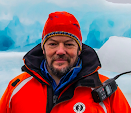Wanderlust: An Eccentric Explorer, An Epic Journey, A Lost Age
by Reid Mitenbuler
New York: Mariner Books, 2023
495 pp: $45.00
Reviewed by Lawrence Millman
Arctic explorers often tend to be of a predacious breed. Give them a destination like the North Pole or the Northwest Passage, and they go into veritable overdrive in an effort to reach it. Consider Admiral Robert Peary. “Mine at last!” he exclaimed upon attaining (or not attaining) the North Pole, as if he had just engineered a corporate takeover.
By contrast, the Danish polymath Peter Freuchen was not (in the words of his biographer Reid Mitenbuler) “a swashbuckling explorer type.” Rather than venture after some sort of Grail, he wanted to experience the Arctic on its own terms, greeting its rough integrity with a rough integrity of his own. He became anthropologist Knud Rasmussen’s assistant at the Thule trading post not because he wanted to trade with the Greenland Inuit, but because he wanted to live with them…and live with them he did, through proverbial through hell and high water. That he died of a heart attack just prior to a televised overflight of the North Pole may be the Arctic’s revenge on him for having an actual goal.
Mitenbuler documents Freuchen’s wanderlust, which took him not just to the Arctic, but also to the Amazon jungle,. Nazi Germany, Soviet Russia, Holly-wood, and the White House. Although all of these travels occurred in the first half of the 20th century, Freuchen often seems like he’d be a broad-minded contemporary. For instance, he issued a warning about climate change as long ago as 1931. He also championed civil rights, environmental stewardship, and animal rights. He put his support of the Inuit not only into his books, but also into the 1933 film Eskimo, for which he ought to be considered the auteur. Yet pretense was not his bailiwick. Quite the contrary. He lost his leg to frostbite and ended up with a prosthesis. Writing to his artist friend Rockwell Kent, he said, “I’m doing just as well with my wooden leg as I did with my old meaten one.”
It’s hardly surprising that Wanderlust is the first biography of Freuchen in English. After all, Freuchen himself wrote detailed accounts of his life in books like Vagrant Viking and Arctic Adventure, and potential biographers might have felt he’d already said what should be said about that life. They might not have wanted to compete with his talent for storytelling, either. Dare I say that his talent for embellishment makes his stories seem even better?
Mitenbueler’s biography is primarily a “just the facts, ma’am” sort of book.
To get his information, the author dug into numerous archives, letters, and diaries as well as consulted Arctic experts like Kenn Harper and Dave Welky. Who would have known that the Netsilik asked Freuchen whether Greenlandic Inuit had whiskers like his? And who would have known that Freuchen hoisted Hollywood actress Jean Harlow above his head to indicate his weight-lifting prowess? The result is what’s typically referred to as a page turner.
On the other hand, the reader familiar with the Arctic might be a bit miffed by the book’s errors and anomalies. For example, Mitenbuler says that no one lived in East Greenland at the time of Fridtjof Nansen’s 1888 ice cap crossing, a statement that’s obviously untrue. He commonly uses the ungrammatical phrase “Inuit people” to describe the Inuit and also says “Inuit man” rather than “Inuk.” He refers to dire wolves and mammoths as being relatives of muskoxen when in fact these species are contemporaries rather than relatives. And he describes one of Freuchen’s lady friends as living “northwest of Hudson Bay, not far from the current village of Rankin Inlet” — a geographical error, since Rankin Inlet is in the middle of western Hudson Bay. The book contains no maps, so the reader can’t look at them and correct the blunders in the text. No maps? How odd for a book whose subject traverses a goodly part of the world…
Its errors notwithstanding, Wanderlust brings to the reader’s attention one of the most enlightened as well as perhaps the most eccentric of all Arctic explorers. None of the others assisted Jewish refugees during World War II or correctly answered a $64,000 question. Nor did any of the others eat rock ptarmigan fecal matter cooked in seal oil and compare its flavor to Roquefort cheese.



An excellent review of a wonderful book.
ReplyDelete